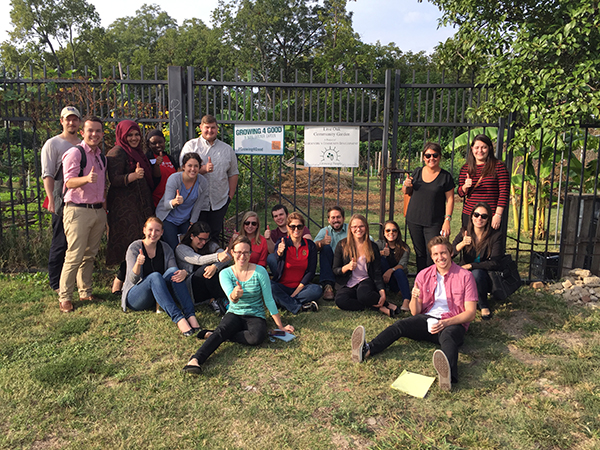Bush School Students to Aid International Rescue Committee (IRC)

Natural disasters or conflicts around the world have increased the need to assist those whose lives have been disrupted or, in many cases, destroyed. Eighteen students at the Bush School of Government and Public Service at Texas A&M University will aid that effort by designing and preparing proposals for the International Rescue Committee (IRC) that improve programs and help the organization apply for much-needed grants to support its work.
The International Rescue Committee is a multinational organization that aids refugees, helps refugees restart their lives, and provides aid and relief to populations experiencing humanitarian crises. In 2015, the IRC supported more than twenty-three million people around the world by providing access to health, education, and financial assistance programming.
Bush School students recently visited IRC’s Dallas office as part of Dr. Silva Hamie’s International Organizations and Refugee Crisis course. Students from Baylor University and Texas A&M’s Agricultural Leadership, Education, and Communications program also participated in the IRC visit.
The visit affected Bush School student Rebecca Skaff personally, and she saw the connection between her life and the concepts discussed in Dr. Hamie’s course.
“My educational understanding of the refugee crisis coupled with my encounter with war as a twelve-year-old back home in Lebanon in 2006 came together during this visit to the IRC. Many of us in Dr. Hamie’s class have prior experiences, skills, and knowledge with war relief and refugee work. The trip was a riveting experience for us,” said Skaff, a first-year student studying international development and economic policy. “I feel confident that our class will contribute meaningful proposals and projects as we move forward both as students and professionals because of this opportunity to learn from the IRC,” she added.
During their two-day visit, students heard from IRC department heads and discussed resettlement and refugee advocacy with the staff. Students also visited communities where the IRC has worked to resettle refugees and toured neighborhood gardens established as part of the organization’s “New Roots” initiative, which places gardens in refugee communities in an effort to provide affordable healthy and organic food and promote sustainable development.
The students from Dr. Michael Piña’s agricultural leadership course will use observations from their visit to create proposals for new programs that will further the mission of the IRC in Dallas. Several groups presented their ideas, which included advocacy campaigns, improvements to the farmers market, and suggestions about urban agriculture in local refugee communities.
“I work in international development, so it was very affecting to see what kinds of work I can do in my home country and to help the populations that I support abroad,” said agriculture leadership student Alene Seiler-Martinez after the visit.

